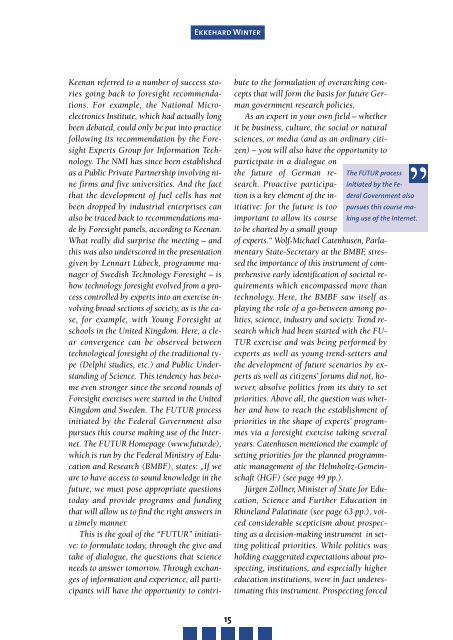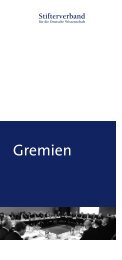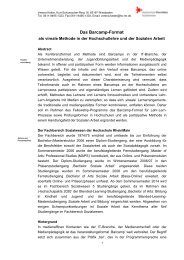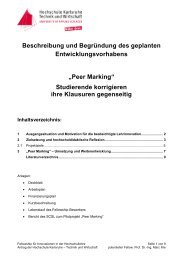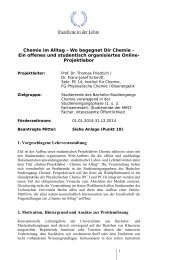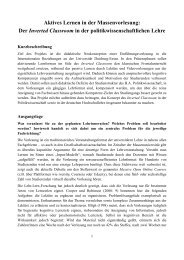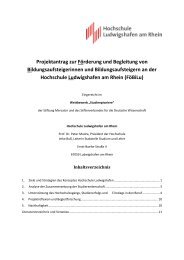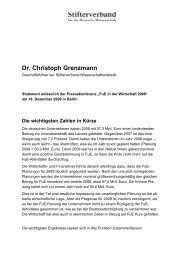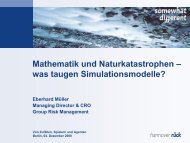Foresight - Stifterverband für die Deutsche Wissenschaft
Foresight - Stifterverband für die Deutsche Wissenschaft
Foresight - Stifterverband für die Deutsche Wissenschaft
Erfolgreiche ePaper selbst erstellen
Machen Sie aus Ihren PDF Publikationen ein blätterbares Flipbook mit unserer einzigartigen Google optimierten e-Paper Software.
Keenan referred to a number of success stories<br />
going back to foresight recommendations.<br />
For example, the National Microelectronics<br />
Institute, which had actually long<br />
been debated, could only be put into practice<br />
following its recommendation by the <strong>Foresight</strong><br />
Experts Group for Information Technology.<br />
The NMI has since been established<br />
as a Public Private Partnership involving nine<br />
firms and five universities. And the fact<br />
that the development of fuel cells has not<br />
been dropped by industrial enterprises can<br />
also be traced back to recommendations made<br />
by <strong>Foresight</strong> panels, according to Keenan.<br />
What really did surprise the meeting – and<br />
this was also underscored in the presentation<br />
given by Lennart Lübeck, programme manager<br />
of Swedish Technology <strong>Foresight</strong> – is<br />
how technology foresight evolved from a process<br />
controlled by experts into an exercise involving<br />
broad sections of society, as is the case,<br />
for example, with Young <strong>Foresight</strong> at<br />
schools in the United Kingdom. Here, a clear<br />
convergence can be observed between<br />
technological foresight of the traditional type<br />
(Delphi stu<strong>die</strong>s, etc.) and Public Understanding<br />
of Science. This tendency has become<br />
even stronger since the second rounds of<br />
<strong>Foresight</strong> exercises were started in the United<br />
Kingdom and Sweden. The FUTUR process<br />
initiated by the Federal Government also<br />
pursues this course making use of the Internet.<br />
The FUTUR Homepage (www.futur.de),<br />
which is run by the Federal Ministry of Education<br />
and Research (BMBF), states: „If we<br />
are to have access to sound knowledge in the<br />
future, we must pose appropriate questions<br />
today and provide programs and funding<br />
that will allow us to find the right answers in<br />
a timely manner.<br />
This is the goal of the “FUTUR” initiative:<br />
to formulate today, through the give and<br />
take of dialogue, the questions that science<br />
needs to answer tomorrow. Through exchanges<br />
of information and experience, all participants<br />
will have the opportunity to contri-<br />
Ekkehard Winter..<br />
15<br />
bute to the formulation of overarching concepts<br />
that will form the basis for future German<br />
government research policies.<br />
As an expert in your own field – whether<br />
it be business, culture, the social or natural<br />
sciences, or media (and as an ordinary citizen)<br />
– you will also have the opportunity to<br />
participate in a dialogue on<br />
the future of German re- The FUTUR process<br />
search. Proactive participa- initiated by the Fetion<br />
is a key element of the inderal Government also<br />
itiative: for the future is too pursues this course ma-<br />
important to allow its course king use of the Internet.<br />
to be charted by a small group<br />
of experts.“ Wolf-Michael Catenhusen, Parlamentary<br />
State-Secretary at the BMBF, stressed<br />
the importance of this instrument of comprehensive<br />
early identification of societal requirements<br />
which encompassed more than<br />
technology. Here, the BMBF saw itself as<br />
playing the role of a go-between among politics,<br />
science, industry and society. Trend research<br />
which had been started with the FU-<br />
TUR exercise and was being performed by<br />
experts as well as young trend-setters and<br />
the development of future scenarios by experts<br />
as well as citizens’ forums did not, however,<br />
absolve politics from its duty to set<br />
priorities. Above all, the question was whether<br />
and how to reach the establishment of<br />
priorities in the shape of experts’ programmes<br />
via a foresight exercise taking several<br />
years. Catenhusen mentioned the example of<br />
setting priorities for the planned programmatic<br />
management of the Helmholtz-Gemeinschaft<br />
(HGF) (see page 49 pp.).<br />
Jürgen Zöllner, Minister of State for Education,<br />
Science and Further Education in<br />
Rhineland Palatinate (see page 63 pp.), voiced<br />
considerable scepticism about prospecting<br />
as a decision-making instrument in setting<br />
political priorities. While politics was<br />
holding exaggerated expectations about prospecting,<br />
institutions, and especially higher<br />
education institutions, were in fact underestimating<br />
this instrument. Prospecting forced


